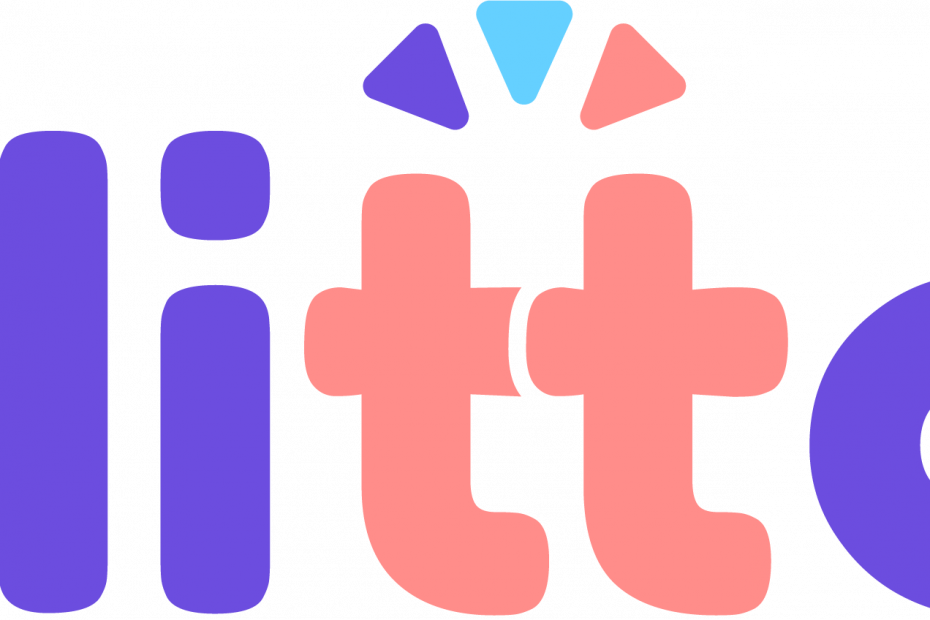Okay, to start this Ditto review, I’m going to say something that I probably shouldn’t…
I’m actually a DistroKid user, myself.
Not a great thing to admit off the bat in this post, right?
But my bet is that, if you’re reading this, you’re probably deep into the details of determining which distributor is best for you – and the chances are even decent that you’re weighing Ditto directly against DistroKid and trying to make a call between the two.
I get it.
And here’s the thing: While I do use (and like) DistroKid, there are some things about it that kind of suck. I don’t think it’s necessarily the best distributor for every artist. Actually, based on my experience, Ditto comes out ahead in several pretty important areas.
So, that’s why I’m writing this review. Long-story-short, I’ve used a few different distributors, and I think that, for some artists, Ditto can be the best choice.
My overall takeaway on using Ditto for music distribution is that it’s a completely viable and impressively cost-efficient option – with a few notable shortcomings.
It’s got plenty of pros. And it has its own warts, too. Overall, I think it’s a good platform.
You can give Ditto a shot here.
(Fair warning, ☝️ that’s an affiliate link, so if you do click it and decided to go with Ditto, I’ll get like 10 bucks.)
And if you want more of the details before making your call, keep reading.
Let’s get into the deets on Ditto.
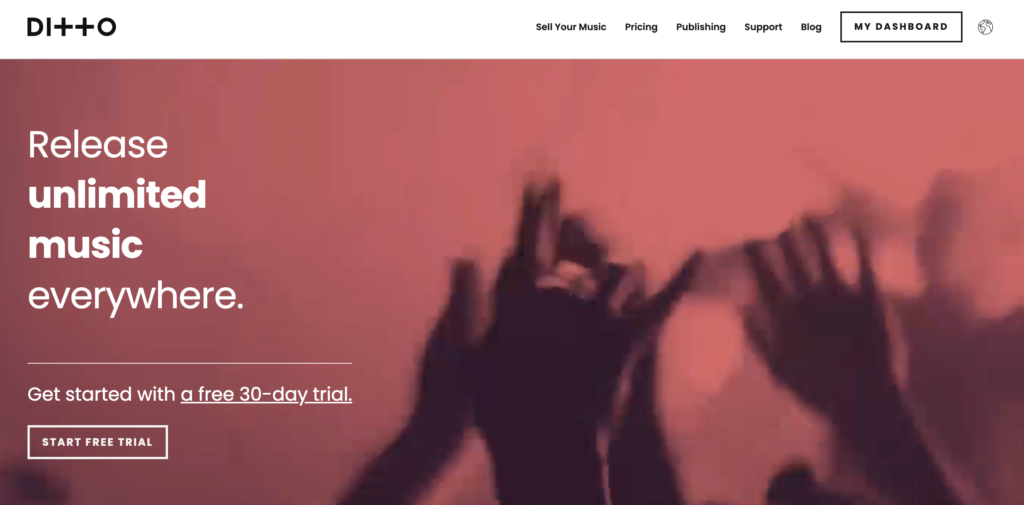
My personal experience using Ditto
“So if you use DistroKid, why should I trust your review of Ditto?” you’re thinking.
Fair question. But don’t worry – I’m also a Ditto user.
Kind of.
Here’s the backstory: I run a music marketing agency called Two Story Media, and I’ve helped some of my artists manage their releases.
Some of my artists’ releases have happened through Ditto.
In fact, over the past few months, I’ve been manually setting up distribution for one of my clients. We’ve put out three releases so far, with more planned throughout the year – and that’s translated to spending a lot of time in the admin panel of Ditto (too much time, for reasons I’ll unpack below).
Here’s what I’ve liked about my experience so far.
The pros of Ditto as a distributor
Let’s start with the good stuff, first.
Ditto is really affordable (and you get to keep all of your royalties).
It used to be annoyingly expensive to release music (and with a few distributors [cough CDBaby cough TuneCore] it still is). But, not too long ago, DistroKid changed the game by offering an “unlimited releases” model that allowed artists to put out any number of songs for a fixed, annual fee.
Today, a bunch of distributors offer some version of this model – including Ditto.
It’s a great model.
Here’s how it works:
Ditto’s plans start at $19 per year.
Pay that, and you can put out as much music as you want under one artist name. For $29 per year, you can put out unlimited releases under two artist names. At higher price points, you can add more artists.
Practically, this is a great deal if you’re planning to release a lot of music. CD Baby would run you $9.95 per single, so if you’re releasing a single each month, you’re looking at around $120 (and that’s not even including their “full monetization package”).
And what separates Ditto from DistroKid – and usually ends up making Ditto a lot cheaper – is that Ditto doesn’t really milk artists for add-ons.
One of DistroKid’s biggest cons, as I’ve written before, is that they tack on fees for almost everything you can think of. Ditto doesn’t. They do charge extra for some things (including pre-selling your music, expediting your release, and registering you to charts). But, for the most part, if you pay your $19, they’ll give you pretty much everything that you’ll really want.
That’s real affordable.
Oh, and you get to keep all of your royalties under this model.
A few newer distributors (including Boost Collective) offer completely free distribution upfront, but compensate for this by collecting a percentage of streaming royalties. With Ditto, you keep everything you make.
That’s real nice.
Ditto is pretty easy to use.
I don’t think it’s the easiest distributor to navigate, but it’s definitely easier to figure out than CD Baby or TuneCore. The wizard is pretty straightforward; once you’ve run through it once or twice, it’ll only take you a few minutes to upload your song. And they have tooltips for a lot of the meta information fields, which are helpful in case you’re not sure what you’re supposed to input.
Maybe the best way to sum it up: Before working with my client, I’d never seen Ditto’s backend panel – and it still took me less than 30 minutes to set up my first single release.
I think that’s pretty solid.
Ditto has all of the features you’d expect.
In my post on the top music distributors, I note that Ditto’s best features include:
- Collaborator splits
- Ditto Music Publishing service to help you collect royalties from more sources.
- Automatic SmartLink with every release – you know, one of those links to stream your song from any platform.
…And yeah, those three things are cool. But, honestly, most distributors offer collaborator splits and smart links now. And while the publishing service is nice, a) it’s an add-on, so you have to pay more for it, and b) there are plenty of publishing services whether you go with Ditto or not.
Here’s the bottom line: Ditto does pretty much everything it should do.
I guess that’s not a hugely compelling pro, but it’s important to point out if you’re considering Ditto as a distributor and you’re worried about the feature set. The platform is just as solid as other leading offerings, and if you go with Ditto, you won’t really be missing out on anything.
Don’t worry. Ditto’s got you covered.
The cons of Ditto as a distributor
All of that said, there are a couple of things that I’ve found pretty annoying about Ditto:
Releases take kind of a long time to be processed.
Now, I realize that “a long time” is relative. Releases used to take forever. But I’m spoiled. I’m used to going through DistroKid, which is a preferred distributor with many streaming services, and, consequently, can usually zip your release to stores faster than you can say “What the heck kind of animal is depicted in the DistroKid logo?”
Ditto releases take longer.
I was caught off-guard by this the first time I ran a release for my client. I set everything up and picked a release date three-plus weeks out, thinking that it’d be plenty of time for the song to be distributed so that we could submit it to Spotify editorial playlists.
It wasn’t.
The release took over two weeks to process. By the time it arrived in stores, we had virtually no time for pre-release submissions.
I’ve found that this isn’t a glitch; it’s just part of the system. Each release I’ve sent through in Ditto has taken at least two weeks to go through.
If you plan ahead, that’s usually fine. But it can get really annoying if things go wrong. For instance, one time, we needed to change the song’s copyright information after we’d submitted it – and that meant that we had to push back our release by another three weeks. What would’ve been a minor hiccup with other distributors turned into a major delay.
It’s worth noting that you can pay for expedited releases. But it’s also worth noting that, with most other distributors, you wouldn’t have to.
Support is really slow.
I mentioned that meta information issue – well, I emailed support about it / filed a ticket in Ditto’s support panel. I heard nothing for about a week… then I got this email:
 (⬆️ You should be able to click on that to blow it up.)
(⬆️ You should be able to click on that to blow it up.)
“Totally understandable,” I thought. “It happens.”
But then, the next time I filed a support ticket, the same thing happened; I literally got the same email, word-for-word. And when I filed a third support request… the same thing happened again.
Moral of the story: based on my experience, Ditto seems to always be behind in responding to support requests.
To be fair, most distributors have slow support (DistroKid’s is pretty lame, too). But the delay in Ditto’s support structure is compounded by the fact that the platform’s releases are so slow. The end result is that, when you have an issue, it takes weeks to get it resolved, and your release dates can get screwed. That’s not great.
But, hey, it is a great exercise in building your patience.
What it’s like to distribute a song using Ditto
Okay, you’ve heard my take on the good and bad of Ditto – now, I’ll give you a quick peek behind the curtain and offer up a few screenshots of the submission process.
Here’s what the inside of the account looks like:
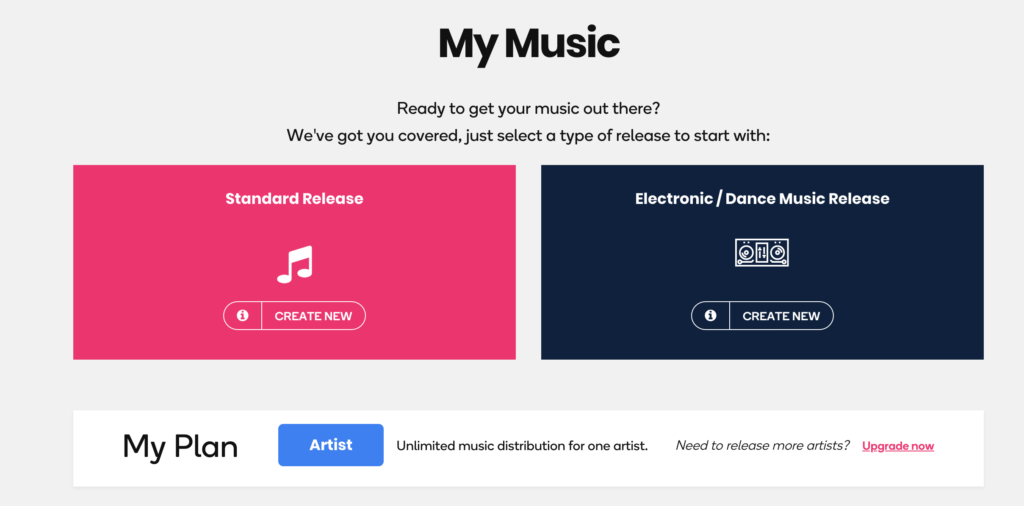
Hit that “Create New” button, and you’ll be taken to a screen that asks for your release information.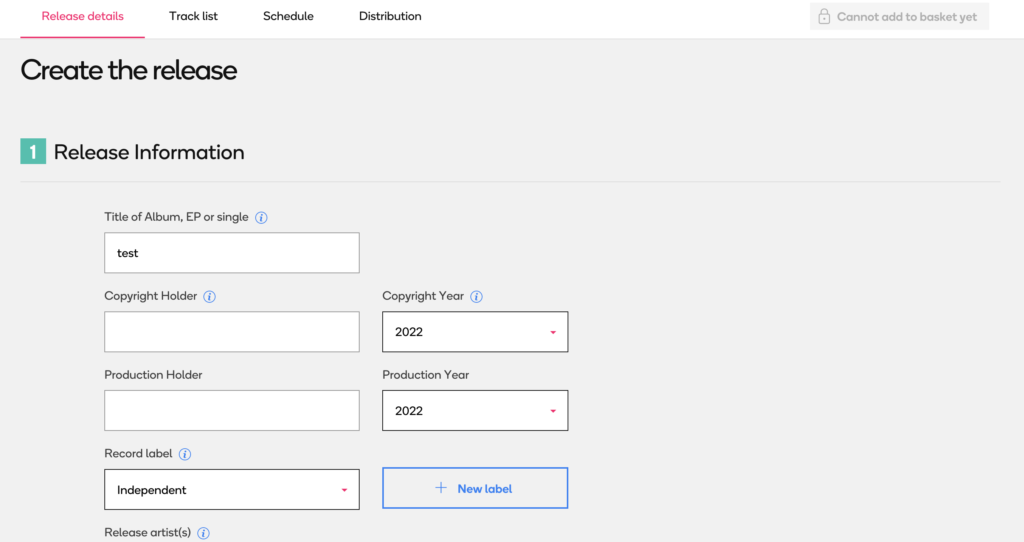
Here’s the second half of that same page:
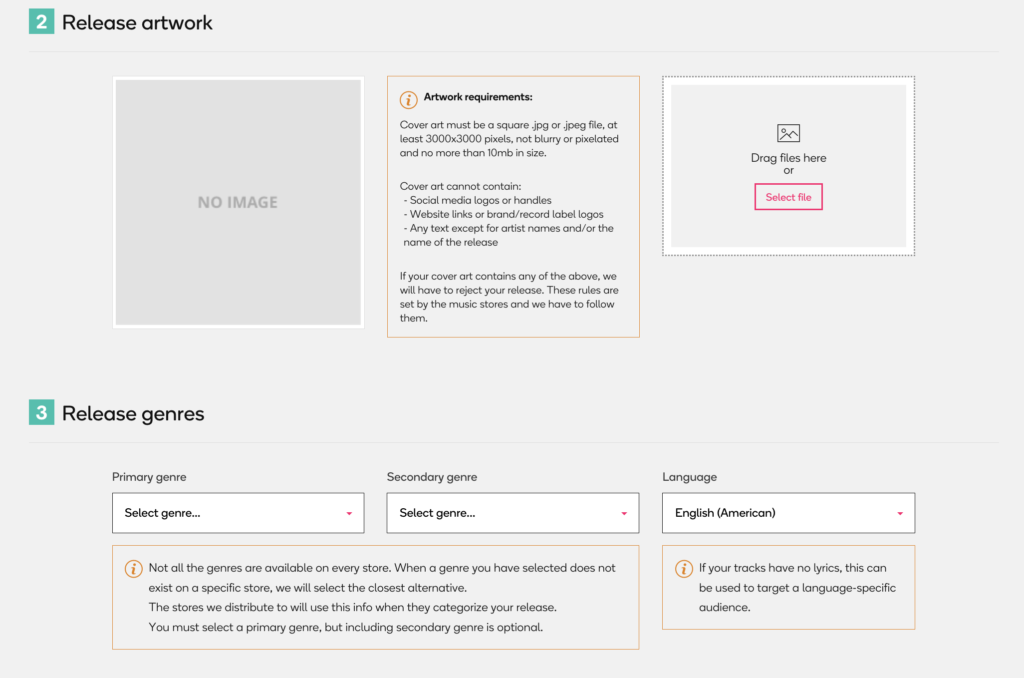
Pretty straightforward. From there, you’ll be asked to set your track list if it’s an EP, an album, or a multi-song single.
Interesting note on that: Yes, you can do multi-song singles. This is what’s known as the cascade release strategy, where each new song lives above the previous song on your streaming profiles. You can only group three songs this way, though – a lesson that my client and I learned the hard way when our release (with seven songs grouped together) got rejected.
Anyway, on the track list page, you’ll actually upload your .wav files, and you’ll be able to set your meta data for each song.
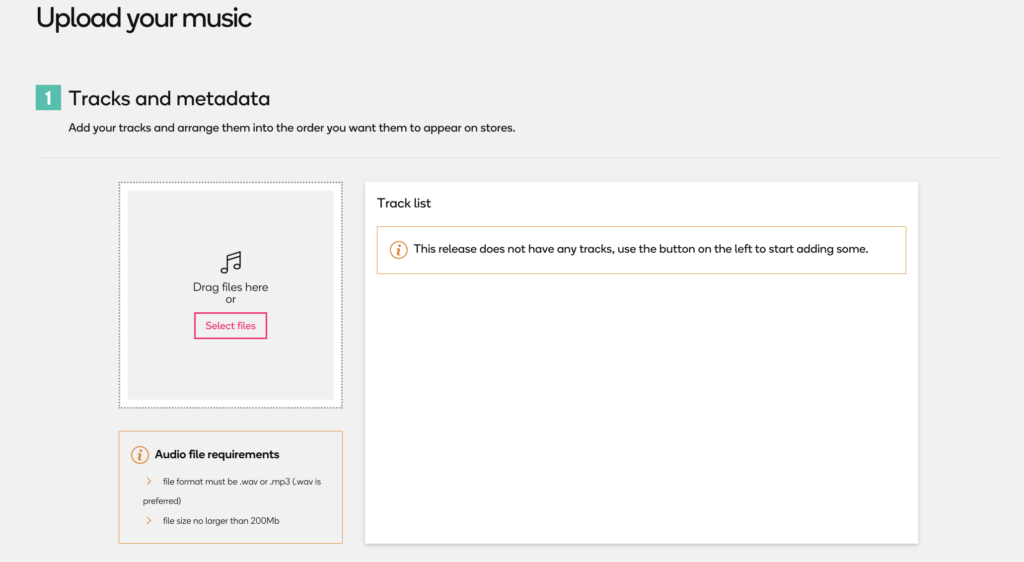
Next, you’ll pick your release date. Note that you can expedite your release for an extra $40 and that doing so gets you close to DistroKid’s turnaround time; even if you opt for an expedited release, it’ll take three days for it to go through.
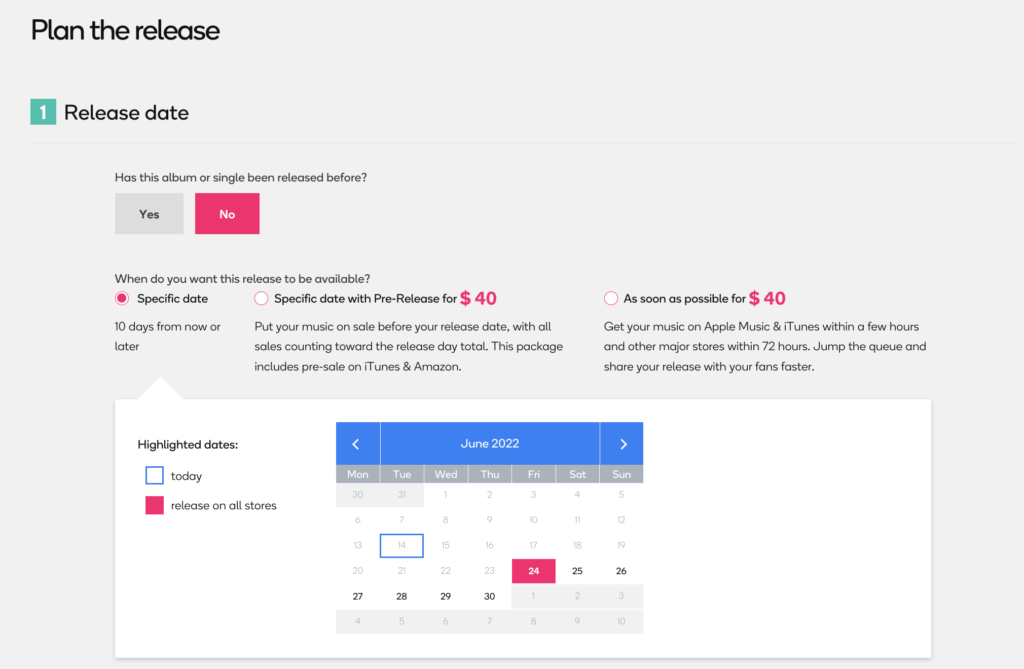
Finally, you’ll be able to select how much you want your tracks to go for in stores (I always selected $0.99), and then pick all of the stores you want to send to.
And, yes, Ditto sends to basically everyone. I remember last year when distributors started bragging that they sent songs to TikTok – now, everyone does.
Again, when you go with Ditto, you aren’t missing out on any functionality.
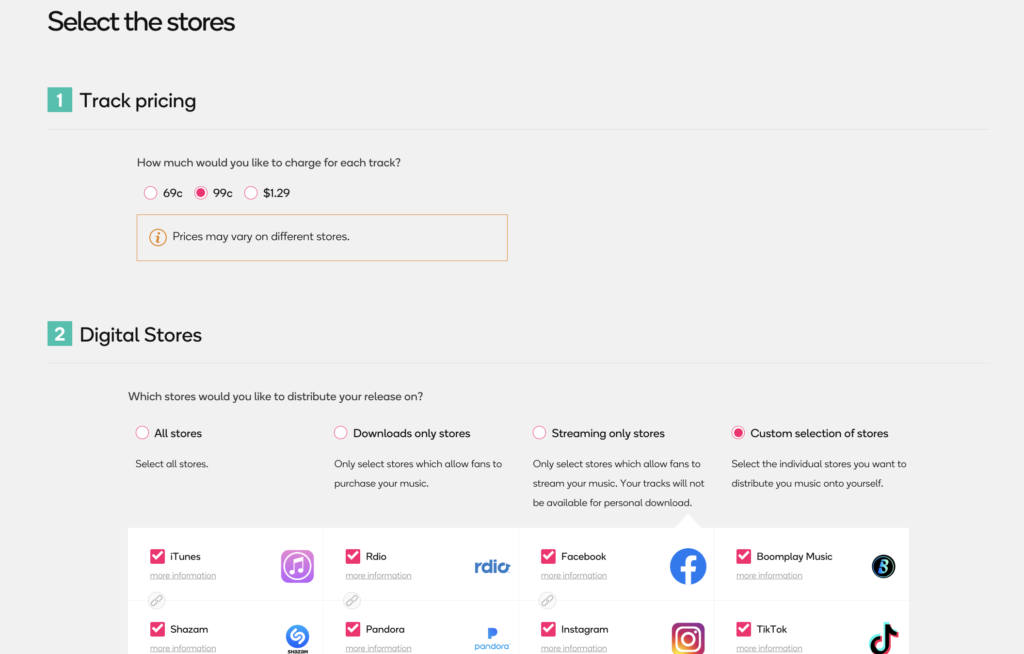
The final screen is the submission review, and it’s what you’d expect. (It’s especially satisfying to see the $0 price tag they show your for “unlimited releases”.) From there, boom, your release is on its way.
Again, this is a pretty straightforward and simple process. It takes minutes. It’s relatively smooth. It’s reasonably well-designed.
